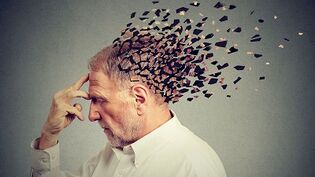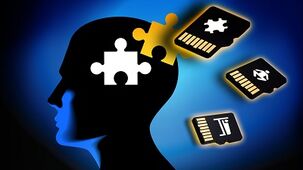
There are conflicting views on drugs to improve memory. Some say that it is useful and helps to overcome the increasing intellectual stress, that it is very helpful and effective.
Others say that this is just a myth, that there is no benefit to taking this drug, it can even be harmful and addictive to this drug. Let’s try to consider these two perspectives in more detail and find out who is right.
A little about memory
Memory is a mental function of higher neural activity, with the help of the collection, preservation and reproduction of previously received information. Memory allows you to store for the long term information about the external world or the body's reaction to any impact, and also allows you to use this information for the organization of proper activities in the future.
Memory includes several different but related processes.
- Memorization- data input, new sensations.
- Storage- data collection, sensations, including processing and assimilation. This process allows a person to learn, develop his thoughts and speech.
- Reproduction and recognition- actualization of elements, actions, sensations from the past. Unintentional reproduction (elements of "floating" in one's mind without will and effort) and arbitrary.
- Forget- loses the ability to reproduce and recognize elements previously remembered. It can be temporary or permanent. There is an incomplete forget, when information is recreated or known to be in error or in part.
Basic memory type
There are many types and subtypes in memory classification. Let's talk about the main types.
- Sensory memory- preservation of information from the senses after stimulating it.
- Tactile memory- preservation of information from receptors due to touch.
- Motor memory- stores information about movements, many may remember that there are movements they do automatically.
- Semantic memory- stores information about facts, for example, stories learned, dates, multiplication tables.
- Short-term memory- stores information for a short time. Has a small volume.
- Long-term memory- long-term retention of information, including lifelong.
Memory Law

Few people know that there are a number of memory laws. This is not the author’s discovery, but a real-life pattern that is scientifically shaped and proven.
- The law of repetition- information is better remembered if repeated several times.
- Interesting Laws- if a person is interested in information, he or she will remember it faster and better.
- Law of the edges- information provided at the beginning and end is best remembered.
- Law of Understanding- if the information has been thoroughly understood, then it will be remembered better.
- The rule of optimum line length- the amount of information remembered should not exceed the amount of short-term memory.
- Installation Law- someone who has provided his own installation that he needs to remember this or that information, will remember it faster and better.
- Law of restriction- when memorizing similar concepts, old information "overlaps" with new.
- Law of Context- when memorizing things that can be related to a familiar concept, it runs faster.
- Law of Action- if what is memorized is used in practice, then memorization takes place more efficiently and quickly.
This law can be used if you want to remember something faster and better, as well as train your memory.
Causes memory loss
- Organic brain damage- acute circulatory disorders, traumatic brain injury, brain tumors.
- Diseases of organs and other systems- diseases of the liver, cardiovascular system.
- External factors- bad ecology, sudden changes in the surrounding conditions, stress, sleep disturbances.
- Age-related brain structure changes- decreased number of interneuronal connections.
- Chronic poisoning- smoking, drug use, substance abuse, alcoholism, drug abuse (sedatives, sedatives).
Memory disorders
Drugs are not prescribed immediately if memory enhancement is required. First they tried to apply non-drug methods. These include:
- A quick walk in the fresh air. This increases oxygen access to the brain. This improves his work efficiency.
- Normalize sleepand stay awake.
- Night training- the habit of remembering all the events of the day in reverse order, that is, first of all, remembering what happened in the evening, and finally - the morning event, can be an unusual exercise. It is better to do this before bed, lying on the bed.
- Positive attitude, do not think about this- do not think that you have a bad memory, nothing cancels the effects of self-hypnosis. If at some point you can not remember something, then do not worry, do not get angry, but just be distracted, do other things, and then try again to remember what you forgot.
- Daily exercises- solve crossword puzzles, puzzles, scans.
- Education- learn poetry, foreign languages, do it regularly, increase the amount of material you learn gradually.
Remedy for memory loss

It is clear that learning poetry, foreign language, solving puzzles is not easy, you have to be "depressed", extra time should be allotted to walk and solve puzzles, which are practically not owned by working people.
It is easier to take pills, calm down and hope the magic power of medicine - your memory will improve and you will not have to do anything! The people of the modern city are so lazy and spoiled by the fruits of civilization that to this day only a few people are very aspiring and want to spend their time and energy to train memory. So someone is looking for an answer to his question - what pills to improve memory?
Therefore, let us consider two opposing opinions on this matter:
Positive opinion
Supporters of the use of these funds say that a number of drugs help increase blood supply to brain cells, thereby improving their nutrition and supplying more oxygen, which increases metabolic processes in neurons.Nootropics and drugs that enhance the rheological properties of blood help in this regard.
Herbal preparations become widespread, which not only enhances metabolic processes in neurons themselves, but also enhances the effects of nootropic drugs.
But it should be remembered that any drug (really does exist) has its own contraindications and side effects, therefore the drug can only be prescribed by a doctor in each particular clinical case.
Negative opinions
According to some experts, there are also weaknesses in coins. A few years ago, experts were puzzled by the question - is this drug effective or just a placebo effect?
The results of many studies, the effectiveness of nootropics has not been proven. There is no evidence that they have a beneficial effect on memory. One small study on the effectiveness of drugs has proven that it has little effect, but not in severe cases.
Traditional methods and herbal preparations such as ginseng, vitamin E, there are almost no studies. The only evidence base for the use of herbal medicine in dementia patients. But there are no data on the effectiveness of its use in relatively healthy people.
In conclusion, I would like to say that when thinking of which drug to improve memory best, do not forget that the drug should be prescribed by a doctor. And doctors should also evaluate its effectiveness in each case. Do not rely on the advice of friends, neighbors, or relatives.
If you think your memory has deteriorated, see a neurologist. Maybe this is not a problem at all, attention may be distracted, there may be some other problems. It is also necessary to find out the cause of this condition. And this can only be done by a qualified doctor.






































































